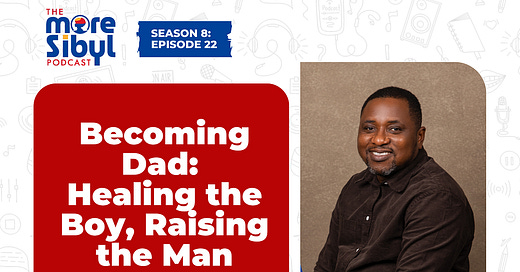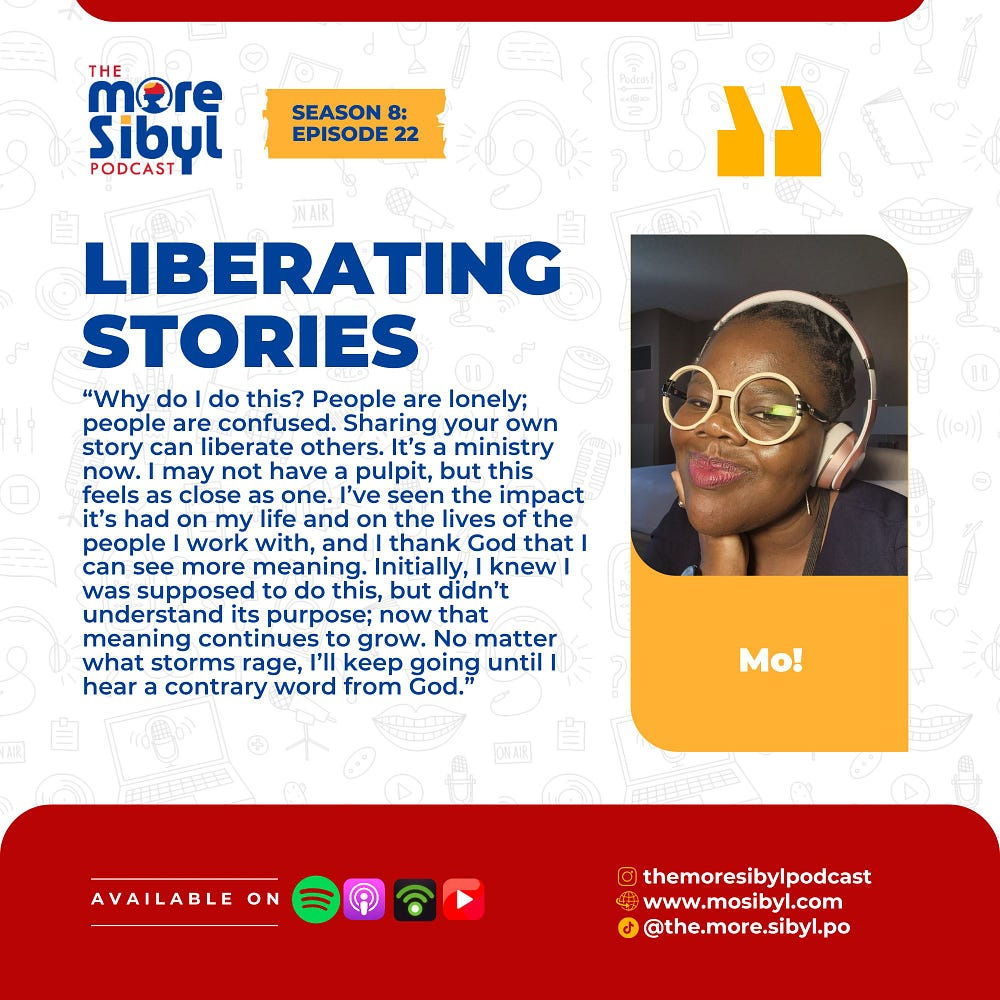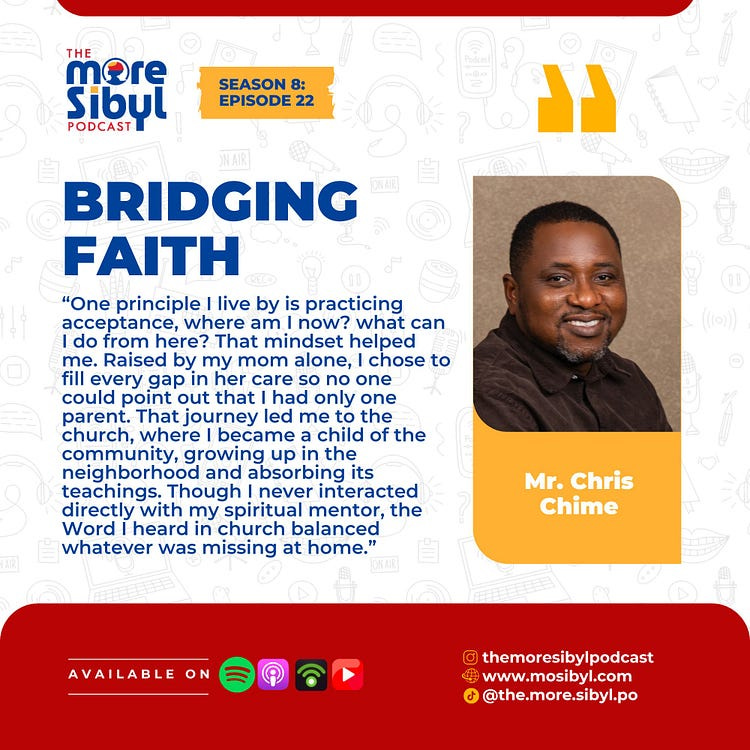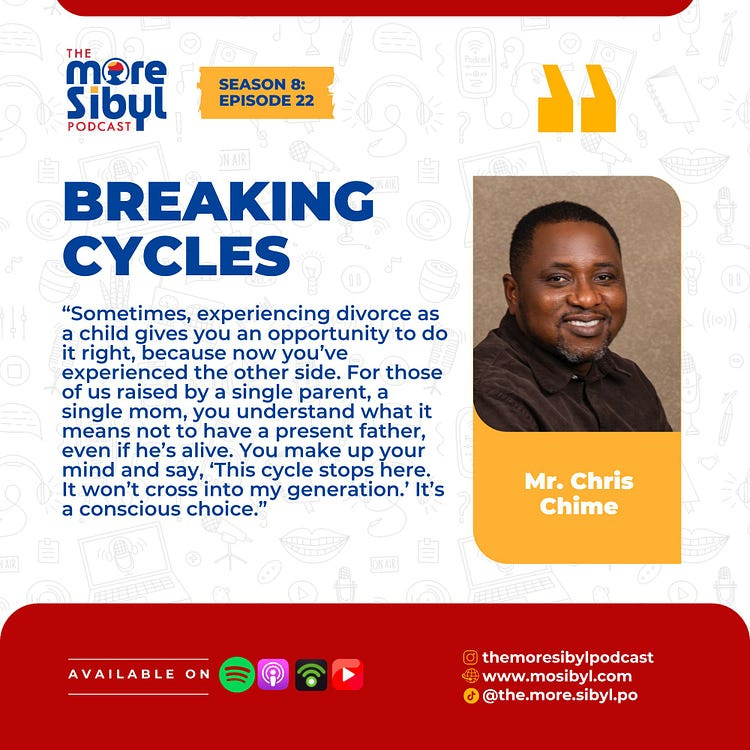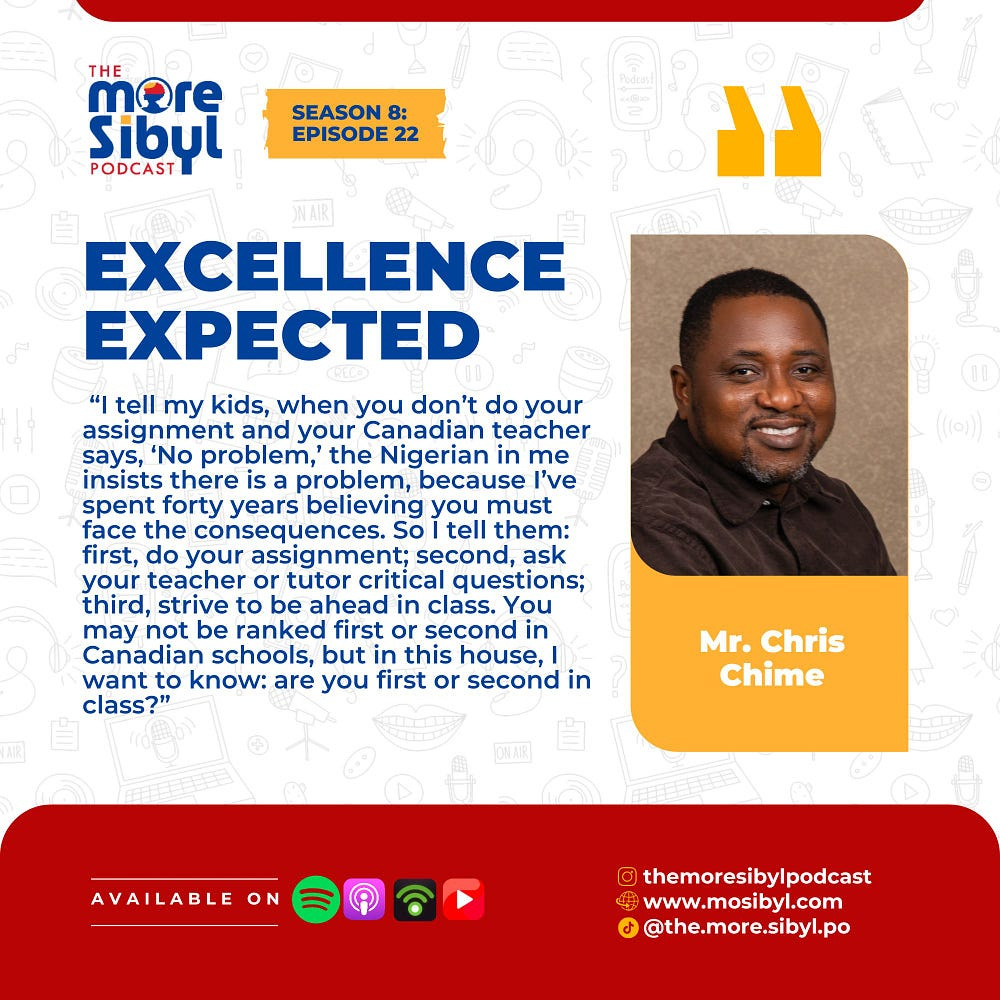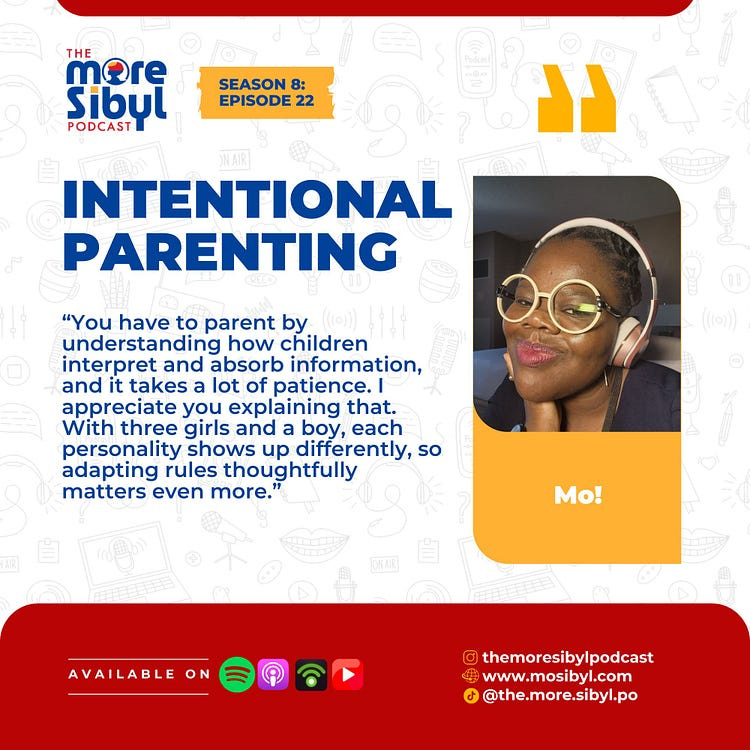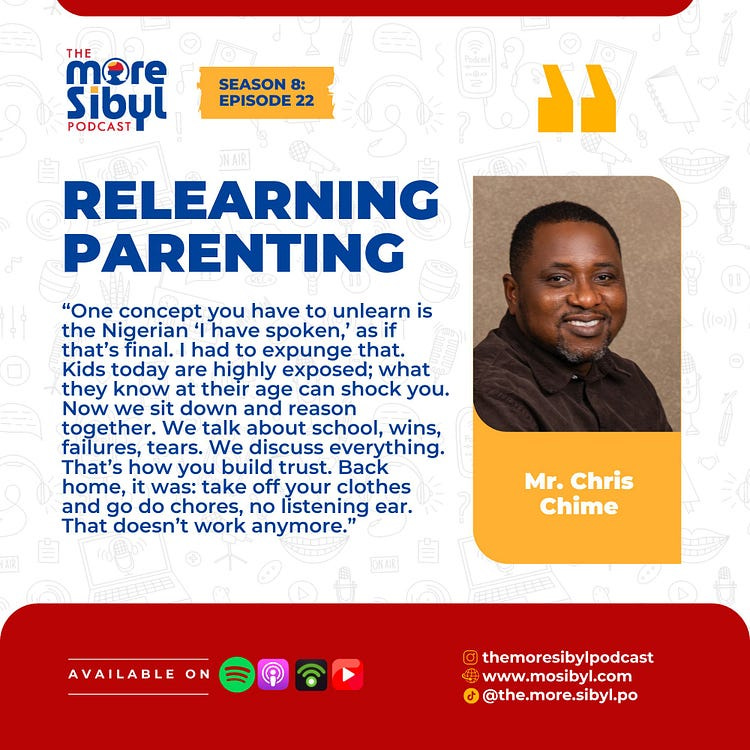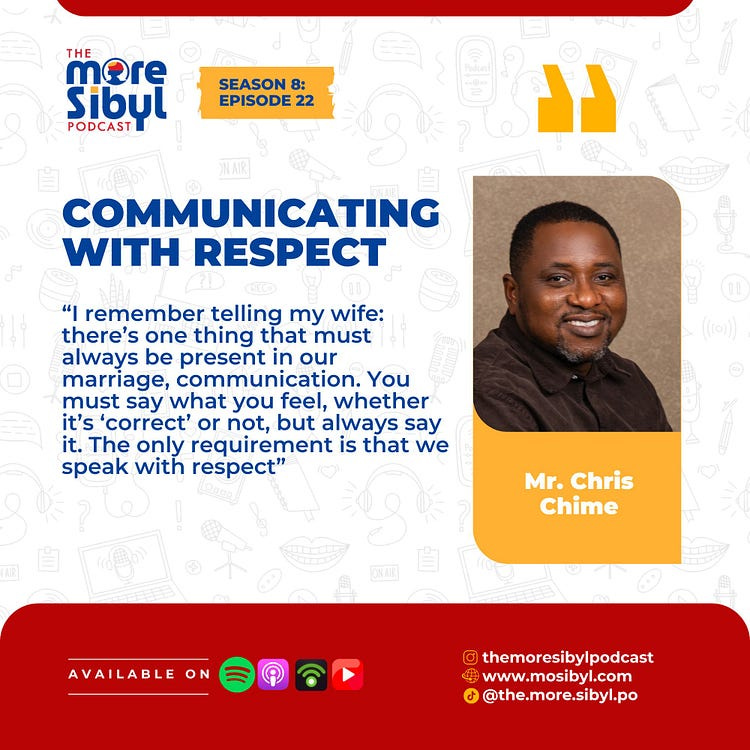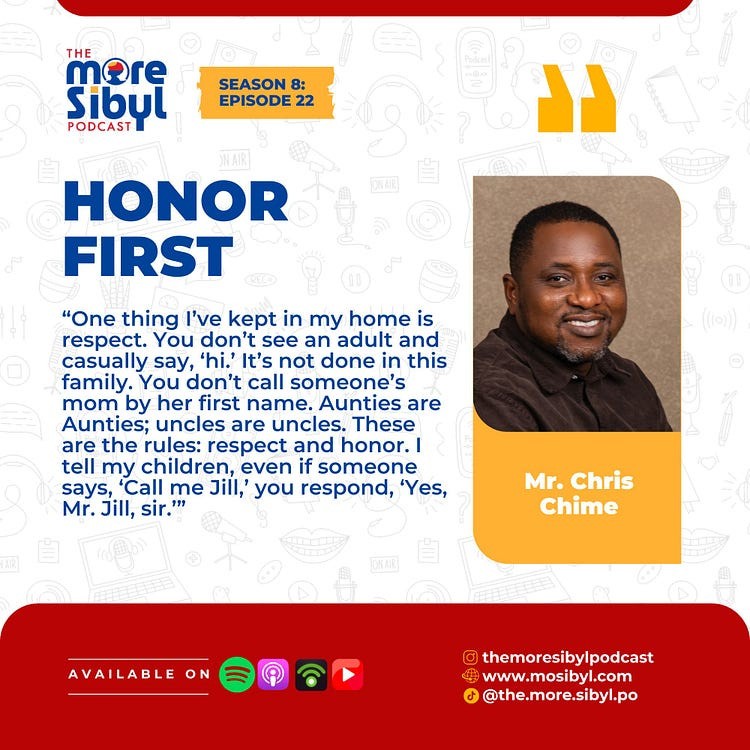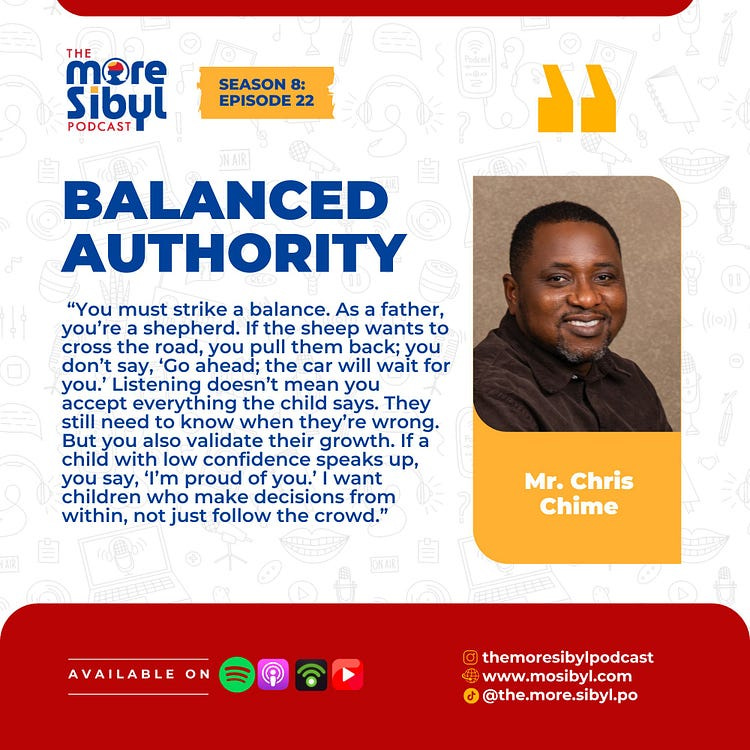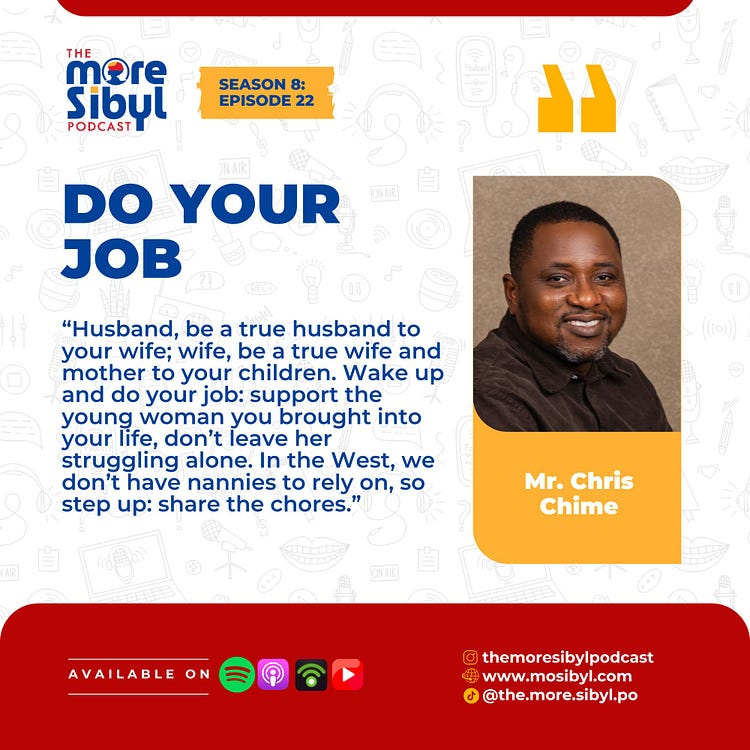Becoming Dad
아버지란 존재의 의미|Healing the Boy, Raising the Man — The One with Mr. Chris Chime | Episode 22 (2025)
“I was practically raised by my mom. I lived with my father only briefly, and we never had a great relationship. The one person who witnessed my journey and stayed committed to it was my mom. I’m grateful to God for giving me such a mother, because she sacrificed everything. Back in secondary school, everyone knew I wanted to make her proud at all times, I saw what she went through. That became the foundation of my life: I didn’t want to do anything that would make her regret it.” — Chris Chime (2025)
BLOG POST
Familiar voices are always a blast to have on the podcast. We had this guest previously this season in Episode 9, where we picked this mastermind’s brain on running a business in the diaspora. Now, I’m honored to welcome back Mr. Chris Chime. If you missed that one, do yourself a favor and catch up — the link will be in the show notes.
He needs no introduction: seasoned entrepreneur and proud father of four. With nearly two decades of experience building businesses in Nigeria and Canada, he knows what it means to lead in high-stakes environments. But today, we’re shifting gears.
In this follow-up conversation, Chris invites us into a more intimate space. We talk about the kind of leadership that isn’t often spotlighted — the quiet, daily, intentional work of being present as a father and husband. Chris opens up about raising children across cultures, navigating the complexities of parenting with grace, and leading his family with faith and purpose. You should be excited!
The Blueprint I Inherited: How My Mother Shaped the Father I Am Today
Since Chris has been here before, we’ve already learned all about his upbringing, such as how he’s the last-born of four children or how seeing charcoal on the ground for the first time inspired his first business idea. So if you want to catch up, do your homework by listening to that episode (you won’t regret it, trust me). This time, I only needed to understand how his background shaped the kind of father he is today.
Chris shared that he was primarily raised by his mother, who became both a parent and a pillar in his life. He described watching her fight through hardship and stay consistent and empathetic through it all. “She’s the God I could lay my eyes on,” he said, capturing just how much reverence he holds for her. Through her tenacity and sacrificial love, she gave him a living example of what it means to show up fully for someone.
That experience shaped Chris’s resolve. He decided early on that he would be a father his children could look up to and a husband his wife could rely on. Watching his mother choose to stay and raise him when she could’ve walked away inspired him to be just as present and grounded in his own family life. Here’s a quote from him that captured it beautifully: “The apple doesn’t fall far from the tree… Don’t look for my mom’s legacy anywhere else — I am her legacy.”
We also discussed the family dynamics that shaped his upbringing. His parents divorced when he was just two years old. Although they reconciled when he was twenty, he emphasized that a significant portion of his foundational years were shaped by his mother alone. He lived with his father for a short time, but described their relationship as transactional — ” Whatever he wants, I give him.” It lacked the emotional bond that marked his connection with his mother.
Chris’s commitment to honoring his mom extended even to his time in secondary school. He recalled how he stayed focused and avoided trouble, not because of external pressure, but because he didn’t want her sacrifices to be in vain. Friends and classmates noticed it too. They would often comment that he must’ve made his mom proud. Her hard work was always at the forefront of his mind, and it fueled a desire to excel.
Now, as a father of four, Chris reflects on that journey with an even deeper appreciation. “Raising kids is not a walk in the park,” he said. And yet, his mother made it seem possible, even under challenging circumstances. Her example didn’t just shape him — it set the standard for the kind of man, husband, and father he’s determined to be.
Real Fatherhood: Presence, Partnership, and Breaking the Cycle
To Chris, being a real father goes far beyond just providing. It’s about caring deeply, listening intentionally, and showing up consistently. It’s about being committed not only to the children but also to the partner you’re parenting with. He believes that one of the most powerful ways to teach love to your children is by loving their mother well. “Children do what they see you do, not what you tell them to do,” he said. So when he shows love to his wife, Vivian, he’s also modeling love for his children in the most tangible way possible.
Chris described himself as “a family man to a fault” and said he makes no apologies for that. For him, family is not just a priority — it’s a calling. What struck me most was how he challenged a mindset many of us grew up hearing: the idea that someone from a divorced home is somehow more likely to fail at marriage. Chris, who was raised by a single mother, flipped that narrative entirely.
“Divorce allows you to do it right,” he said. In his view, people who have experienced the absence or breakdown of family often understand its value more deeply. While some people from intact families may take that stability for granted and “misbehave in marriage,” those from single-parent homes often carry a stronger determination not to repeat what they saw. Chris made it clear that the cycle can be broken and that it’s a choice. He said, “You understand what it means to have a father who is alive but not present… You make up your mind. This must stop here. It must never cross my generation.”
Hearing him say that was a powerful reminder of how much intentionality matters. It’s not just about what you inherit — it’s what you do with it. And Chris has chosen to show up with love, discipline, and a clear vision of the legacy he wants to build.
Finding Wholeness in Community
As we got deeper into the conversation, Chris shared exactly how he was intentional in becoming a better father — and it did not start when he got married. First, he accepted his situation. “One of the things I do in life is I practice acceptance. Where am I now? What can I do from here?”
Instead of fixating on what he lacked, he focused on how to fill those gaps. He didn’t try to pretend that everything was perfect, but he also didn’t let the absence of a father define his path. “Whatever she lacked in her ability to give me, I found it elsewhere,” he said of his mom. “That’s why I went to church.”
Chris leaned into the community. “I’m a child of the community,” he declared proudly. He explained how the church played a critical role in his growth. It wasn’t about religion for him — it was about purpose and intentionality. He sought out marriage classes as a teenager, sitting in rooms meant for adults, not because he was in a rush to marry, but because he wanted to understand what breaks marriages and how to avoid them. His spiritual father became a mentor, even without one-on-one interaction, simply through listening to the Word.
He described this season of learning as a time when he was “getting ready for marriage,” often 10 years ahead of his peers in terms of mindset and maturity. His passion for family life was born from this search for understanding. “Everything will begin and fall at that nuclear zone,” he said of the home. Career, accolades, and success all matter — but according to Chris, none of it holds weight if your family life is in shambles. “That’s the place where you are known.”
Chris emphasized the importance of creating balance wherever there’s a lack. “Whatever you lost… you should find yourself in a community where you can gain that thing back.” And not casually, but “with all sense of purpose.” He contrasted his path with friends who had stable homes but still went astray, saying some of them took their family structures for granted.
That entire section of our conversation prompted me to reflect on the value of communal support, particularly in the Nigerian context. In our culture, the idea that it takes a village to raise a child isn’t just a saying — it’s still very much alive. From extended family to religious communities, many of us were raised by networks, not just individuals. Even in the absence of formal systems like the Department of Human Services (DHS), we’ve had unofficial foster parents: an uncle, an auntie, a teacher, or a church member who stepped in.
Of course, we’re not without our issues — abuse and other challenges exist — but one thing we do have is a deep-rooted value for collective parenting. And I hope that as our communities evolve and people migrate or adopt different cultural norms, we don’t lose that. Because raising kids in isolation isn’t sustainable. And as Chris so beautifully reminded me, healing and wholeness often begin when we choose to lean into the strength of community.
Raising Whole Children Between Two Worlds
This flowed seamlessly into the next part of our conversation — raising children between two worlds. In Chris’s case, it is between Nigeria and Canada. His response was as insightful as his masterclass on business. He didn’t just speak as a parent; he spoke as someone deeply committed to the work of intentional parenting.
Chris made it clear that you can’t chase career goals and leave your parenting on autopilot. “We cannot chase careers at the expense of raising our children,” he said. He drew attention to how easy it is to mistake surface-level progress for actual growth or good behavior, like having a fancy accent. We must remind ourselves that sounding like an American or Canadian doesn’t necessarily mean a child is well-raised.
He’s seen something in Southeast Asian homes that he shed light on: no matter where they relocate, they bring their value systems with them and replicate those values at home. He believes African families should do the same. Chris discussed how, in his house, his children have private tutors — just like many kids would have back in Nigeria.
He had me laughing when he explained how he challenges the “no problem” culture in Canadian schools, such as when students don’t do their homework and it’s accepted. “Your teacher says there is no problem because you are not their problem,” he told his kids. “But I’m telling you, if you don’t do your homework, there is a problem.” He doesn’t believe in overly permissive parenting and says it plainly: “I’m not your friend. I’m your father. I become your friend when you are 18.”
What I loved most was his metaphor of the home as an embassy. “When you’re inside this house, this is my own embassy. Outside is Canada. Inside here, we are going to marry both societies.” He sees himself as the visionary of his home — someone who ventures outside to select the best from Canadian culture and brings it back in, while also preserving the core values of his heritage. He’s not interested in throwing away everything Nigerian just because they now live in Canada.
Ultimately, Chris’s goal is to raise children who are whole, sound, and confident. And to do that, he believes you must blend the best of both worlds — with structure, intention, and unshakable values at the center.
Parenting with Patience, Presence, and Precision
Another important thing he tries to do consistently is connect with his kids. “I immerse myself in their world… so I can expunge the things that shouldn’t be there.” He doesn’t just bark orders or lay down the law; he studies them, plays with them, asks questions, and even learns Gen Z slang to stay connected. I jokingly reminded him that when he uses their slang, “it stops looking cool.” But that doesn’t stop him, because connection matters more.
Chris explained that while we may have grown up in environments where parenting meant command and control, he’s learned to take a different, more nuanced approach. It’s not about shouting or threatening — it’s about understanding each child individually. Some of his kids need just a word to understand; others need a whole sit-down, a clear explanation of the bigger picture, and space to process it all. He meets each of them where they are.
One story he shared beautifully illustrated what parenting with structure can look like, even without the use of corporal punishment. One day, after repeated warnings about the state of their room, he packed up all the electronics and kept them in his room for two weeks. Needless to say, the girls completely lost it. “It was as if I took the oxygen supply off,” he said. But the point wasn’t just to punish — it was to drive a lesson home. And he didn’t cave the minute they cleaned up. He told them, “I’m not giving them back until I see consistency.”
He acknowledged that, while corporal punishment might have been common where they grew up, living in a place like Canada requires a different kind of wisdom. You don’t beat the child, but you still discipline. He told his children, “The government says I shouldn’t touch you, but they are still building prisons. Doesn’t that tell you something?”
Just because the law prohibits physical discipline doesn’t mean the law absolves consequences altogether. If you don’t parent intentionally, society will correct your children, and often not with compassion.
I appreciated how Chris also touched on the diversity of parenting styles within a single household. With three girls and a boy — and four distinct personalities — no two children receive the same approach. He said it plainly: “Our kids don’t have the same parents.” Because the way we relate to each child must evolve based on who they are and how they’re wired.
What We Keep & What We Unlearn
Of course, not everything is perfect in the way we raise children in Nigeria. So here is what Chris has kept — and what he has had to let go of lovingly.
He kept respect. This is non-negotiable in his home. “You do not see an adult and say ‘hi.’ Don’t do that in this family,” he said firmly. Regardless of how many Canadian families might find that acceptable, his children are taught to greet elders respectfully. Coming from Nigeria’s Southeast, where they don’t typically prostrate as in the Yoruba tradition, Chris still upholds the culture of honor. “Uncles are uncles, aunties are aunties, you don’t call an older person (old enough to be your parent) by their first name.” He even shared a story about their elderly apartment facility manager, Mr. Jill. Despite the man’s insistence that he be addressed by his first name, Chris instructed his children to continue calling him “Mr. Jill, sir.” Why? “He’s over 70. I can’t even call him by name.” Even when the culture around you relaxes formality, he believes children must still be taught to honor age and experience.
The one he had to break was the idea that a parent’s word is final and unquestionable. In Nigeria, it was common to hear, “I’ve spoken. Case closed.” But in Canada, parenting demands more conversation — more listening. “You’re dealing with children whose level of exposure is so high,” he said. So now, when his kids come home, he carves out time for them to debrief their day. “Tell me your wins. Tell me your failures. Tell me your tears.” No detail is too small. He emphasized the importance of being the first person to validate their own experiences, so that no one else defines them. However, on this point, a balance still needs to be struck.
He likened fatherhood to shepherding. A shepherd doesn’t stand back while the sheep cross a dangerous road; he guides them, even when the sheep don’t “like” it.
He shared the example of one of his children struggling with self-confidence. Instead of telling her to ignore what others say or dismissing her feelings with a “just face your books,” Chris leaned in. He paid attention to her behavior, noticed when specific comments made her moody, and walked her through her emotions. Whenever she displayed confidence, he affirmed it. “I heard you did this. I’m very proud of you.” His parenting is characterized by subtle adjustments that recognize and acknowledge both struggles and victories.
Chris also teaches his kids not to assume that everyone in their classroom is coming from the same kind of home. “Don’t get lost in the crowd,” he warns them. Just because you’re all sitting in the same class doesn’t mean you’re all coming from the same emotional space. He described how some kids go to school having just watched their parents get high. Others are being raised by grandparents who, while loving, aren’t there to discipline — ” because you are not their problem.” That line made me laugh, but it’s so true. Grandparents have done their part. It’s now the parents’ job.
Ultimately, Chris reminds his kids that not all pain is visible. “When you see a child that snaps at even a ‘hi,’ know that there’s pain behind it. Show compassion.” It’s a kind of wisdom that comes from someone who’s not just parenting children, but raising humans with depth, empathy, and vision.
More on Cultivating Meaningful Connections With His Kids
At one point in our conversation, I asked Chris something I’d been thinking about lately, especially now that my husband and I just welcomed a new baby. I wanted to know how he stays connected with each of his children individually. You know, one-on-one time, personal outings, intentional moments. I was asking for myself.
Chris lit up immediately, sharing that it’s something he and his wife are very intentional about. For starters, they’ve built a strong family culture around outings — a tradition that began back when they were still living in Nigeria. Every quarter, they’d take their daughters to lovely places to introduce them to beauty and create positive family experiences. “We want them to see those places before anybody will introduce them to it,” he said.
Since moving to Canada, they’ve maintained the practice, adjusting the rhythm to fit their new environment. Now, every first Sunday of the month, the whole family goes out to eat. Regardless of which birthday it is that month, the person gets to choose the restaurant. It becomes an opportunity not just for good food, but for authentic connection. They laugh, they chat, and in between bites and jokes, Chris and his wife sprinkle in life lessons. For instance, they use everyday moments — such as holding the door for someone or cleaning up after yourself at a restaurant — as teaching opportunities for manners, respect, and consideration.
But the real gems came when he started describing the ways he’s now beginning to shift toward one-on-one time as his kids become teenagers. Sometimes, if he’s picking one of them up from school badminton practice, he’ll turn the ride into a mini-date. Maybe they’ll stop for chocolate. It’s less about the treat and more about creating space to talk. No pressure. Just openness.
When there’s a school report or incident that needs addressing, Chris and his wife have a deliberate approach. They speak to the child involved alone, without siblings present. He explained that this gives them space to define themselves without shame or encouraging sibling rivalry. And because he knows his kids so well, sometimes he can even predict who probably did what. “If I hear a report, I can tell. It’s in line with the challenge I’ve been seeing,” he said. These aren’t lectures — they’re conversations. They unpack what happened and why, and he connects it back to earlier things he’s already taught at home.
Chris was also very candid about what makes this kind of parenting possible: time. Not just loving the idea of quality time, but intentionally making it happen. His wife chose her career path in a way that prioritized family life. Chris noted, “Both of us cannot be out there.” Because without time, there’s no connection. And without connection, there’s no opportunity to influence your kids truly.
And you know what? I’ve met these kids, and I have to say — they are genuinely lovely humans. When we visited with our daughter, Ariife, they made her hair and treated her with so much care. They are genuinely a good reflection of their parents.
Drawing the Line: Choosing Your Spouse Without Disrespecting Your Roots
This part of the conversation is one of my favorites. Five years ago, during a visit to his home in Canada, he told me something unforgettable: no family member, no matter how close, is allowed to come between him and his wife. He made it clear that he won’t allow it. That kind of boundary-setting — especially in our cultural context — is rare and truly commendable. How does he do it? What made this mindset so strong?
Well, Chris took me back to his childhood. He sat his parents down and asked, “What made this divorce happen?” An outside party had suggested to his dad to get a new wife. He found it absurd that someone could walk into your home and tell your wife to be replaced while their wife remains untouched. For him, that moment revealed how deeply some men fail to protect their homes from outside interference.
He traced many family breakdowns to what he called “sibling weakness” — a blind loyalty to siblings at the expense of a spouse. But for Chris, it’s simple: he was the one who chose his wife. She was fine in her father’s house. He said he was in love. So he must protect her. If anyone has a problem with her, they can bring it to him — but they shouldn’t expect him to agree. He’ll address any issues privately with his wife, not in front of others.
Scripture guides his principles. “Husbands, love your wives as Christ loves the Church.” (Ephesians 5:25). And as he explained, the Church isn’t perfect. There are fake pastors, boundary crossers, and everything in between. Yet God doesn’t discard them. So why do men act like their wives’ minor faults deserve public judgment?
Chris also questioned the cultural values of an Igbo man in marriage. He took a hard look at traditions that undermined love or fueled control and weighed them against his values. People have “made the word of God of no effect by their traditions,” he said, quoting Scripture (Mark 7:13). For him, stripping away harmful cultural habits and keeping what truly builds unity is necessary wisdom.
He’s not anti-culture (we know from previous conversations) — he doesn’t believe it should override covenant.
What really stayed with me was his reflection on extended family. He acknowledged how hard it can be to set boundaries with uncles or relatives who raised us or funded our education out of a sense of honor. But he insists that there must be a line. A simple, “Uncle, thank you. I honor you. But this part of my life you cannot touch. I’ll manage it,” will do wonders.
He’s right — it’s not easy to say no to elders. But Chris believes true respect includes the courage to protect what you’ve built. “Your wife is not a saint, just like you’re not,” he said, “but if she knows she’s protected, she’ll fight for you with everything she has.”
It was a powerful reminder: protection isn’t just about shielding someone from harm. Sometimes, it’s about knowing when to shut the door — even to voices that believe they have a right to enter.
When Love Means Drawing the Line
What happens when a wife no longer feels protected? When resentment builds because her husband can’t or won’t set boundaries with his family? When the home she’s supposed to thrive in becomes a battleground of influence?
Chris was clear on the matter. Many men simply don’t know how to say “no.” They’re so preoccupied with not offending parents or siblings that they allow behaviors that quietly erode their marriage. “It can’t happen,” he said. “Not in my house.”
He pushed back on the idea that closeness means a lack of boundaries. That’s not true. “Once you’re married,” he said, “you and your spouse must define what your marriage will look like. Forget what your parents or culture taught you.” He warned that when couples fail to do this, it leads to serious cracks in the foundation.
Chris described what happens when extended family members “pitch a tent” against a spouse. But if they complain about your wife, shut it down. To him, real love isn’t passive. Real love is firm. It says “no” when necessary. It protects.
He brought up a common issue: property. Some husbands write only their names on documents — even when their wives are full contributors. That single act, he said, tells a woman she has no real stake. “You’re already setting yourself up for failure.”
Chris emphasized that women are territorial by nature. They want to guard their homes. But once they stop feeling safe or respected in that space, they begin to withdraw. And unlike men, who often return emotionally, once many women check out, they’re done.
The key to preventing this, Chris insisted, is communication. Not just sweet words or surface-level “I love yous,” but honest, respectful conversations. “You have to learn to have hard conversations in your marriage,” he shared. Early in their marriage, he’d wake his wife at 1 a.m. to discuss issues because he couldn’t rest with things unresolved. Eventually, they grew out of that stage — but he still insists on one rule: “Say what you feel. Whether right or wrong, say it with respect.”
One more thing: never touch certain sacred things during arguments. Don’t threaten divorce or suggest that your spouse is replaceable. “Once you say it,” he warned, “your spouse starts to pull back. Even if you say you didn’t mean it, the seed has been planted.”
Chris reminded me that love isn’t just affection — it’s action. It’s boundaries. It’s choosing your spouse over comfort or cultural pressure. It’s doing the hard things so your marriage doesn’t quietly erode while everyone else thinks it’s fine. It’s dying to self and knowing that the marriage is not about either of you, it’s about both of you. (Thank you, Chris!)
Returning to the Basics: Family First, Always
As we wrapped up our conversation, Chris left us with one final charge: “Husband, be a true husband to your wife. Wife, be a true wife and a mother to your children. Husband, wake up and do your job.”
He spoke directly to the reality that many couples — especially those of us navigating marriage and parenthood in the West — face. Here, we don’t always have nannies or extended family readily available. There are no aunties on standby. And yet, some men are still acting like chairmen in their own homes, refusing to help while their wives do everything. He said it plainly: “In the West, we help our wives. We bathe the children. We do things.”
Chris didn’t just appeal to fairness; he appealed to compassion. He reminded us that the woman you brought into your home is still trying to hold on to parts of herself. “She doesn’t want the $50 nails she just did to keep breaking while she does everything alone,” he said. The message was clear: ease her burden. Do your part.
We also discussed how the Nigerian community has made significant strides in their careers. From medicine to tech to finance, we’re flying high. But Chris cautioned that if we don’t turn our attention back to the home front, we’ll suffer in ways that no amount of money can fix. Children who aren’t equipped emotionally or spiritually won’t be able to handle the very legacies we worked so hard to build for them.
And then came his most sobering observation: many people today are living like strangers in their own homes. The rising rates of divorce stem from how quickly we now threaten to abandon our relationships. “Women become so touchy. You can’t take a joke. Before you say Jack, you’re already meeting a lawyer,” he said. And who suffers the most? “The kids.”
Chris’s heart for family is so evident. “Everything begins and ends at the family point,” he said. And as he spoke, it reminded me that building a family isn’t about perfection — it’s about intention. It’s about not letting our culture, trauma, or even ambition get in the way of doing what matters most: loving and protecting the people we do life with.
To hear the whole conversation, go back and listen to the episode. And if you haven’t already, check out Episode 9, where Chris first joined the podcast to share about purpose and entrepreneurship.
As always, thank you for tuning in to this space where we honor our past, sit honestly with our present, and lean into who we’re becoming. Take care of yourselves and your people, and continue to evolve.
Chris, you’re already part of this podcast family, so get ready for your next return.
🅻🅸🅽🅺🆂:
Download: https://mcdn.podbean.com/mf/web/6g8zxv3pit2jmk6n/CHIMEAGAIN2025.mp3
Or on the website: www.mosibyl.com
Chris’s Previous episode: https://mosibyl.podbean.com/e/chime2025/

